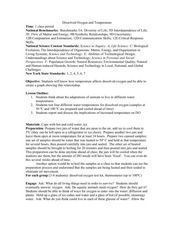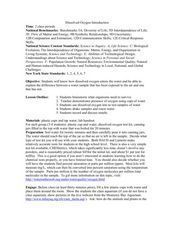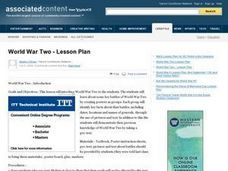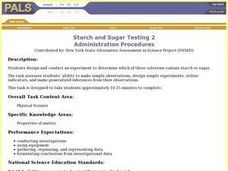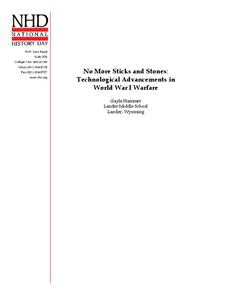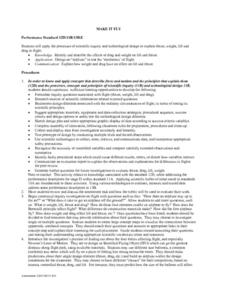Curated OER
Dissolved Oxygen and Temperature
Learners are shown how temperature affects dissolved oxygen and they create a graph showing this relationship. They think about the adaptations of animals to live in different water temperatures. Students test four different water...
Curated OER
Dissolved Oxygen Introduction
High schoolers are shown how dissolved oxygen enters the water. They are taught the difference between a water sample that has been exposed to the air and one that has not. Students brainstorm what organisms need to survive. They use...
Curated OER
How Can You Tell One Clear Gas From Another?
Fifth graders perform experiments to determine the identity of an unknown gas sample. In this chemistry lesson, 5th graders fill balloons with air, oxygen, hydrogen, and carbon dioxide. They use mass and reactivity to identify the gases.
Curated OER
Thomas Jefferson and the Declaration of Independence
Students examine readings and symbols to learn about the War of Independence and Thomas Jefferson. For this War of Independence lesson, students explore the role of Thomas Jefferson in the Declaration for Independence. Students answer...
Curated OER
Capitals, Oceans, And Border States
Students investigate geography by completing games with classmates. For this United States of America lesson, students examine a map of North America and identify the borders of Mexico and Canada as well as the Pacific and Atlantic....
Curated OER
World War II
Students create a Powerpoint presentation covering key information regarding a World War II battle and present the information to the class in the form of an oral presentation. They then will turn in a summary report including two...
Curated OER
Starch and Sugar Testing 2
Students design and conduct an experiment to determine which of three solutions contain starch or sugar. This task assess students' ability to make simple observations, design simple experiments, utilize indicators, and make generalized...
Curated OER
Vitamin C Testing
Pupils determine which of three beverage samples contains the most vitamin C. They then apply their knowledge to an additional situation. Students use beverages that have a large, definite difference of vitamin C content to facilitate...
Nemours KidsHealth
Feelings: Grades K-2
Learners explore how to appropriately deal with their feelings. In this personal health activity on feelings, students participate in a group discussion about feelings, and complete two activities writing about their feelings and...
Virginia Department of Education
A Mystery to Solve
Investigate field properties of real numbers. Scholars use a table for a given operation to determine the identity element. They use the same table to find a missing value in an equation.
American Chemical Society
Curious Crystals
Crystals are more than meets the eye! Can learners tell them apart simply by observation? As they examine five samples with a magnifier, they find that appearance alone is not enough. This serves as an introduction to a mini unit on...
Nemours KidsHealth
Stress: Grades 9-12
Everyone feels stress from time to time, but how can you move past it? A seven-page packet of activities guides high schoolers through the process of recognizing and managing their stress. The resource includes discussion topics, a...
American Chemical Society
Changing State: Evaporation
Why do experiments require a control? Guide scholars through designing an experiment to see what they can do to evaporate water faster with a lesson that stresses the importance of controlling all variables. The second activity...
National History Day
No More Sticks and Stones: Technological Advancements in World War I Warfare
Remind young historians that many technological advancements influenced the events of World War I. After analyzing technology's evolution through primary sources, discussing the changes over time, and watching various video clips,...
American Chemical Society
Evaporation
This is one in several lessons that explore the relationship between temperature and phase changes of water. After some discussion, elementary physical scientists place wet paper toweling on a hot and a room-temperature water bag...
American Chemical Society
Can Liquids Dissolve in Water?
How does food coloring work? Classes watch a demonstration showing liquids dissolving in liquids. In groups, they then explore the ability of other liquids to dissolve in water (alcohol, mineral oil, and corn syrup) by setting up and...
Curated OER
Finding the Main Idea and Supporting Details
Twelfth graders examine how to identify the main idea and supporting details in a reading passage. They read an article, answer who, what, when, where, and how, discuss the answers, and identify the main idea and supporting details.
Curated OER
Time is On My Side!
Fourth graders review the most effective test taking and studying skills. As a class, they are introduced to how to self-manage themselves when it comes to the activities they have to complete. To end the lesson, they complete a pretend...
Curated OER
What is That White Stuff?
Fifth graders identify, through experimentation, what properties of substance are, determine what variables tested will be, identify constants and variables of experiment, conduct experiment to conclusion with measurable, recorded...
Curated OER
The Difference Between Acids and Bases Using Different Indicators
Students identify the differences between acids and bases. In this acids and bases lesson plan, students identify and distinguish between acids and bases. They use household products to test the ph levels. They test the ph levels by...
Curated OER
Mineral Identification
In this mineral identification lesson plan, students analyze 14 minerals and test their physical properties. They test the color, luster, streak, hardness and breakage of each mineral. Students answer 5 questions about the physical...
Curated OER
Variables and Controls in an Investigation
Seventh graders identify variables and controls in a paper airplane investigation. In this scientific method lesson, 7th graders conduct an experiment to determine the variables that affect the flight of paper airplanes. They design an...
Curated OER
MAKE IT FLY
Students utilize the process of scientific inquiry and technological design to explain thrust, weight, lift and drag in flight. They design an "airplane" to test the "mechanics" of flight. In addition, they brainstorm and sketch a design...
Curated OER
Ester Lab
Students investigate making esters in the lab. In this ester lesson plan, students mix 3 organic acids with 3 alcohols and a catalyst to form 3 different esters. Students identify the odors of each ester and write the formulas for the...
